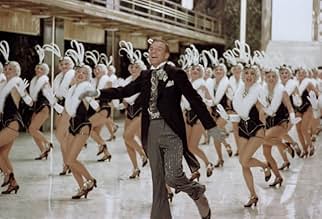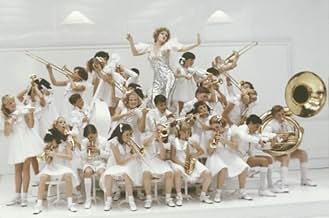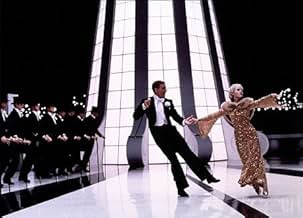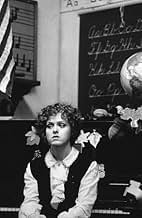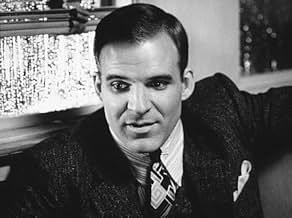NOTE IMDb
6,5/10
6,5 k
MA NOTE
Ajouter une intrigue dans votre langueDuring the Great Depression, a sheet-music salesman seeks to escape his dreary life through popular music and a love affair with an innocent schoolteacher.During the Great Depression, a sheet-music salesman seeks to escape his dreary life through popular music and a love affair with an innocent schoolteacher.During the Great Depression, a sheet-music salesman seeks to escape his dreary life through popular music and a love affair with an innocent schoolteacher.
- Réalisation
- Scénario
- Casting principal
- Nommé pour 3 Oscars
- 3 victoires et 9 nominations au total
Francis X. McCarthy
- The Bartender
- (as Frank McCarthy)
Shirley Kirkes Mar
- Tart
- (as Shirley Kirkes)
Avis à la une
10robb_772
An Americanized adaptation of the six-part 1978 British miniseries, underrated director Herbert Ross' brilliant PENNIES FROM HEAVEN was a huge commercial flop in US when originally released. Audiences of 1981 did not seem to understand the concept of a depression-era musical, where the actors lip-synch to original recording from the in 1930s in elaborate fantasies that are far removed from the actual world in which they inhabit. Though extremely unconventional, this device is absolutely heart-wrenching as the dreariness of the real world breaks away to the brightly-colored, perpetually optimistic fantasy land that only lives in the lyrics of popular songs. It is the eternal agony of the dreamer that is expressed; the cold reality that leaves us destined to reach for the sky, but doomed to walk the earth.
This leaves the film's cast with a difficult task, as they must not only contend with their dramatic art, but also be well versed in a variety of demanding dances and highly disciplined choreography. Comedian Steve Martin is far from the first choice to portray the downtrodden protagonist in any film, but the actor acquits himself expertly in both the film's demanding dance and drama. Mousy Jessica Harper delves into her eternally repressed character so deeply that one is never certain where one stops and the other begins; a triumph of form for any thespian. Renowned dancer Vernel Bagneris is mesmerizing as the film's most ambiguous character, and his density-defying dance to Arthur Tracy's heartbreaking rendition of the title song is one of my favorite moments in any film.
Even more impressive is tough guy actor Christopher Walken's then-unexpected prowess on the dance floor, as he delivers a riotously funny and surprisingly sexy striptease to Irving Aaronson's "Let's Misbehave." In this sequence, Walken pulls off the difficult hat trick of satisfying both seasoned viewers and film neophytes, while still managing to leave both groups wanting more. Best of all, however, is the lovely Bernadette Peters in a superb, Golden Globe award-winning performance. Never before has Peters' slightly tarnished Kewpie-doll personae been better utilized, and the actress' transformation from repressed schoolmarm to hardened prostitute feels both stunningly and horrifyingly real.
Herbert Ross and his creative team manage to bind all of the pieces together into one seamless collage of lost hope, forced optimism, and never-ending desperation. Gordon Willis' cinematography is never less than completely awe-inspiring, and the combined efforts of top-drawer art and set direction and Bob Mackie's seemingly authentic period costumes helps cement the look and feel of desolate decade that the film represents. Over all films in every genre, PENNIES FROM HEAVEN would be a likely contender to receive my vote for the single most underrated film masterpiece of the last twenty years. It exudes all of the contradictory joy and heartbreak that the movies offer, and serves it all up in one stunning presentation.
This leaves the film's cast with a difficult task, as they must not only contend with their dramatic art, but also be well versed in a variety of demanding dances and highly disciplined choreography. Comedian Steve Martin is far from the first choice to portray the downtrodden protagonist in any film, but the actor acquits himself expertly in both the film's demanding dance and drama. Mousy Jessica Harper delves into her eternally repressed character so deeply that one is never certain where one stops and the other begins; a triumph of form for any thespian. Renowned dancer Vernel Bagneris is mesmerizing as the film's most ambiguous character, and his density-defying dance to Arthur Tracy's heartbreaking rendition of the title song is one of my favorite moments in any film.
Even more impressive is tough guy actor Christopher Walken's then-unexpected prowess on the dance floor, as he delivers a riotously funny and surprisingly sexy striptease to Irving Aaronson's "Let's Misbehave." In this sequence, Walken pulls off the difficult hat trick of satisfying both seasoned viewers and film neophytes, while still managing to leave both groups wanting more. Best of all, however, is the lovely Bernadette Peters in a superb, Golden Globe award-winning performance. Never before has Peters' slightly tarnished Kewpie-doll personae been better utilized, and the actress' transformation from repressed schoolmarm to hardened prostitute feels both stunningly and horrifyingly real.
Herbert Ross and his creative team manage to bind all of the pieces together into one seamless collage of lost hope, forced optimism, and never-ending desperation. Gordon Willis' cinematography is never less than completely awe-inspiring, and the combined efforts of top-drawer art and set direction and Bob Mackie's seemingly authentic period costumes helps cement the look and feel of desolate decade that the film represents. Over all films in every genre, PENNIES FROM HEAVEN would be a likely contender to receive my vote for the single most underrated film masterpiece of the last twenty years. It exudes all of the contradictory joy and heartbreak that the movies offer, and serves it all up in one stunning presentation.
I am glad I don't live in Frostbite Falls because I might shiver at the thought of such a complex and clever film as PENNIES FROM HEAVEN. Made with a massive 1980 budget of $22 million and all of it up there on the screen, this genuine masterwork is one of the great unappreciated and misunderstood films of its day. The biggest hurdle the film could not overcome (then) was the casting of comedy stars in Art Deco darkness. Steve Martin had just scored a bullseye in the wild comedy THE JERK. For mainstream audiences to even then turn around and slightly embrace the sad loneliness of PENNIES' aching melancholy is impossible. PENNIES' failed and was consigned to misfire history. Today in 2005 this film deserves to stand with CHICAGO or even MOULIN ROUGE in its sly dark new century crowd pleaser theatrics. It is a film for this century and if audiences today have the chance to appreciate and applaud it's brilliant creative slant and dramatic spectacle, it will be a success. Possibly in the same ironic fantasy manner of THE PIRATE or YOLANDA AND THE THIEF, or LADY IN THE DARK of the 40s, ITS ALWAYS FAIR WEATHER from 1955, maybe THE BOYFRIEND of the 70s and even the original 1988 HAIRSPRAY by John Waters, PENNIES' belongs to that rare style of musical spectacle: the emotional fantasy with a dark satire core. Truly great.
Heavy-going, off-putting Depression-era musical (set to old recordings of the 1930s) is quite elaborate and usually looks good, but is filled with ciphers. Steve Martin, in a fair dramatic acting turn, plays a sex-obsessed sheet-music salesman in Chicago with no conscience who cheats on his frigid wife with a schoolteacher, later becoming involved in a murder investigation. Unfortunately for Martin, this character is such a crude, lascivious lout, we don't really care about his fate or whether or not his teacher-girlfriend (now a prostitute) leaves him. Jessica Harper (as the cold-fish wife) is every married man's nightmare: the bride-turned-shrew; Bernadette Peters is somewhat more sympathetic as the lover, and gets to utilize her natural Kewpie doll-ness to fantastic effect in the musical numbers. But, for the most part, "Pennies From Heaven" is peopled with low-lifes. The extravagant showstoppers, fantasy sequences designed like mini Busby Berkeley movies, are breathlessly intricate and exciting to watch, but they provide little emotional subtext for what's happening in the real world (I don't know if original creator Dennis Potter meant it or not, but the material plays like "Up the Sandbox" with music). Herbert Ross directed with a heavy hand, though he does get some fine moments from his cast, especially Christopher Walken as a hoofing pimp. An expensive remake of a British mini-series starring Bob Hoskins, the movie ultimately feels a bit claustrophobic and sluggish, and has an unsatisfying wrap-up to its reedy-thin plot. **1/2 from ****
the more I am amazed. It is the film that Chicago could have been were it not for its irony. I never saw the BBC original, but fondly remember Potter's "The Singing Detective." I can understand that Hoskin's Cockney optimism would fit Pennies' lead character to a tee, but Martin gives us a hint of the fragility of the song pusher's world, like Willy Loman, out there on a shoeshine, and for Martin, a song.
The film is innovative and definitely not your father's musical, and the songs, done up not in 1981 over-orchestration but in that tinny sound of early vinyl, just blow me away. After I saw it, I went searching for Follow the Fleet just to see 'Face the Music' in reel time.
This film will not be everyone's cup of tea. It is one of those movies that I say works best when you begin with "Once upon a time."
The film is innovative and definitely not your father's musical, and the songs, done up not in 1981 over-orchestration but in that tinny sound of early vinyl, just blow me away. After I saw it, I went searching for Follow the Fleet just to see 'Face the Music' in reel time.
This film will not be everyone's cup of tea. It is one of those movies that I say works best when you begin with "Once upon a time."
It's 1934 Chicago. Sheet music salesman Arthur Parker (Steve Martin) can't get any love from his wife Joan (Jessica Harper) both in the bedroom and in the bank book. She wants to keep her inheritance for a rainy day but he wants to use it for his business. He befriends penniless hitchhiking Accordion Man. He falls for school teacher Eileen (Bernadette Peters) and they have a short affair as he lies to her about being a widow telling her to "take the pain away". His wife Joan entices him back with sex and money. Eileen is fired for being pregnant out of wedlock. Arthur meets a blind girl calling her beautiful. Later the Accordion Man rapes her and kills her. A desperate Eileen falls into the arms of Tom the pimp (Christopher Walken).
This is a sad depressing movie juxtaposed by the bright shiny surreal song and dance show. The story is such a downer. Arthur is a horrible person. Eileen is an innocent that is destroyed. There is a horrible crime. Yet this is a fantasy with dance reminiscent of the 30s except darker. It's a very odd mix and is almost experimental in its nature. It's definitely not a comedy.
This is a sad depressing movie juxtaposed by the bright shiny surreal song and dance show. The story is such a downer. Arthur is a horrible person. Eileen is an innocent that is destroyed. There is a horrible crime. Yet this is a fantasy with dance reminiscent of the 30s except darker. It's a very odd mix and is almost experimental in its nature. It's definitely not a comedy.
Le saviez-vous
- AnecdotesChristopher Walken's bar-top dance scene took two months of rehearsal and two days of shooting. He claims he got compliments later from fans Fred Astaire and Gene Kelly.
- GaffesIn the classroom, a modern Canadian flag can be seen. It wasn't designed until 1964.
- Citations
Joan Parker: [referring to Arthur's male organ, after discovering he's having an affair] Cut his thing off.
[the detective shows a look of shock and disgust]
Joan Parker: I want them to cut his thing off and bury it!
- Bandes originalesPennies from Heaven
(1936)
Written by Johnny Burke and Arthur Johnston
Published by Intersong Music
Performed by Arthur Tracy
Courtesy of Decca Co. Ltd
Later sung by Steve Martin (uncredited)
Meilleurs choix
Connectez-vous pour évaluer et suivre la liste de favoris afin de recevoir des recommandations personnalisées
- How long is Pennies from Heaven?Alimenté par Alexa
Détails
- Date de sortie
- Pays d’origine
- Langue
- Aussi connu sous le nom de
- Pennies from Heaven
- Lieux de tournage
- 4th Street Bridge, Los Angeles, Californie, États-Unis(murder scene, S Santa Fe Ave. Overpass)
- Sociétés de production
- Voir plus de crédits d'entreprise sur IMDbPro
Box-office
- Budget
- 22 000 000 $US (estimé)
- Montant brut aux États-Unis et au Canada
- 9 171 289 $US
- Montant brut mondial
- 9 171 289 $US
- Durée1 heure 48 minutes
- Mixage
- Rapport de forme
- 1.85 : 1
Contribuer à cette page
Suggérer une modification ou ajouter du contenu manquant

Lacune principale
By what name was Tout l'or du ciel (1981) officially released in India in English?
Répondre



